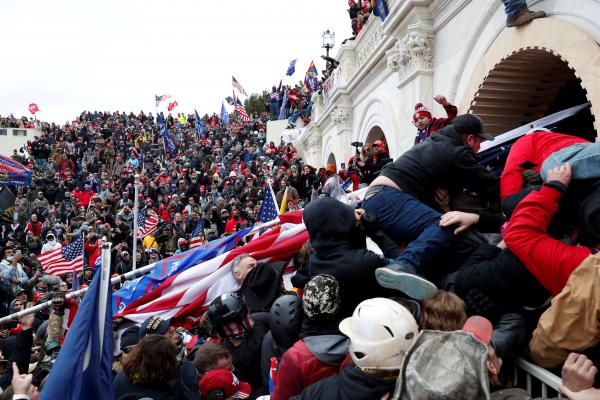By now, you’ve seen the photo: A man – one of those who breached the U.S. Capitol on Wednesday – sitting in House Speaker Nancy Pelosi’s office chair, casually reclined, feet on her desk. “He is at home,” writes Dante Stewart, “That is what is most disturbing: He knows that there is no place that his body cannot travel and not be protected. I look at the image and am amazed at the audacity of terrible white American men and at the ways we protect them.”
In other images from Wednesday’s attempted coup, those who invaded the Capitol were seen carrying Christian flags, large crosses, and signs with messages such as “Jesus is my savior. Trump is my president.” This is Christian nationalism at its clearest, explained experts: “Many people want to say these movements that are nationalist or white supremacist are not Christian movements,” historian Kelly J. Baker told Sojourners. “But they very much are.”
As I tried to process all these images flooding my news feed, I was reminded of another set of photos, taken at a Senate office building in November 2017 when members of Sojourners’ staff joined other faith leaders to protest a new tax bill. After refusing to stop reading Bible verses about God’s commands to protect the poor, 12 people were arrested in act of civil disobedience. Despite the group’s modest size and nonviolent actions, dozens of U.S. Capitol Police officers were present. It was a stark contrast to the minimal police presence encountered by the mob who scaled walls, broke glass, and used tear gas to enter the U.S. Capitol building by force — just one more place their bodies could travel, and for the most part, still be protected.
1. They Invaded the Capitol Saying ‘Jesus Is My Savior. Trump Is My President’
Christian nationalism is essential to understanding what motivated many of the rioters. By Gina Ciliberto and Stephanie Russell-Kraft via sojo.net
2. In Photos: Epiphany Celebrations Amid the Pandemic
Christians on Wednesday marked Epiphany in the middle of the coronavirus pandemic, which hindered celebrations in many places but didn't stop some defying warnings to honor traditions. By the editors of the Daily Sabah.
3. Faith Groups Call for Trump's Removal Following Capitol Attacks
In addition to Trump’s removal, the petition calls for the “investigation and possible expulsion of every member of Congress who violated their oath of office by trying to reverse an election.” By Stephanie Russell-Kraft via sojo.net.
4. The Cleft in the Rock: A Theology of Negative Spaces
“Think of the space opened up by the parting of the Red Sea, for example, or of particular empty wombs and tombs which are among the most profound negative spaces in scripture.”By Daniel Drage via Image.
5. Their Lives Are Defended. Ours Are Ruined
“He knows that there is no place that his body cannot travel and not be protected.” By Dante Stewart via sojo.net.
6. How Zora Neale Hurston Helped Her Readers Understand the World
“There are a dozen scenes in black American novels where a child is going along happily until someone (often a schoolteacher) points out the ‘difference’ in his life, which is also the difference of his future.” By Lily Rothman via Time.
7. When Does a Mob Become a Coup?
The Coup-o-Meter reached a new high. By Lexi McMenamin via sojo.net.
8. Warnock's Georgia Win Highlights Growing Strength of Progressive Faith Vote
“Scripture tells us that weeping may endure for the night, but joy comes in the morning,” Warnock said. By Curtis Yee via sojo.net.
9. Rabbit Hole
A podcast exploring how YouTube algorithms helped radicalize a young man to the far right. By Kevin Roose via The New York Times.
10. Sedition and Silence
A political coup holds hands with theological heresy. By Jim Wallis via sojo.net.
Got something to say about what you're reading? We value your feedback!

